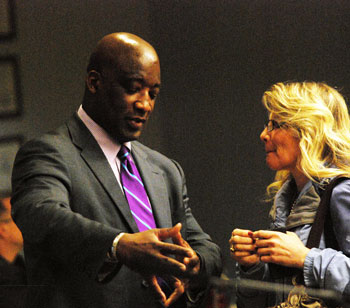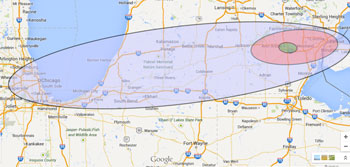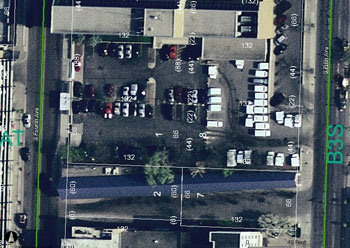AAATA Preps to Shift Gears
Ann Arbor Area Transportation Authority board meeting (Aug. 21, 2014): The meeting began with CEO Michael Ford’s formal announcement of news that board members and the public had already heard – that he was leaving the AAATA in mid-October to take the job as CEO of the southeast Michigan Regional Transit Authority. Ford had formally tendered his resignation that day. The four-county area of the RTA includes the counties of Washtenaw, Wayne, Macomb and Oakland as well as the city of Detroit.

CEO Michael Ford listens to public commentary at the Aug. 21 meeting of the Ann Arbor Area Transportation Authority board. (Photos by the writer.)
Two items on the board’s voting agenda related at least indirectly to the leadership transition that the AAATA will be making. First, the board approved a resolution authorizing board chair Charles Griffith to appoint an ad hoc subcommittee to conduct a search for Ford’s replacement. The resolution approved by the board at its Aug. 21 meeting also authorized $50,000 for consulting services to help with the search.
Griffith said he has asked board members Anya Dale, Gillian Ream Gainsley and Eric Mahler to serve with him on the search committee, citing a desire to have a mix of board experience and geographic diversity represented on that group.
Second, the board approved the AAATA’s FY 2015 work plan, which will provide the basis for the FY 2015 budget. The budget will appear on the board’s Sept. 25 agenda for approval. The AAATA’s fiscal year runs from October through September. At the Aug. 21 meeting, Sue Gott credited Ford with developing the work plan, saying it would be valuable as a blueprint for the transition in leadership.
A major decision on the choice of bus technology might be made after Ford departs the AAATA in mid-October. Although the board approved a 5-year bus procurement contract with Gillig, and authorized an order for the first 27 of up to 60 buses called for in the 5-year contract, the board left the choice of drive-train technology open – between hybrid electric technology and clean diesel. The upfront capital cost difference is $200,000 per bus more for the hybrid technology. That final choice of technology will need to be made by the November board meeting.
Also at its Aug. 21 meeting, the board amended its pension plan to recognize same-sex marriages, which stemmed from a Supreme Court decision striking down the Defense of Marriage Act and the IRS ruling that resulted from that decision.
The board chose to delay approval of new service standards, which are a required element of AAATA’s Title VI compliance. The board can meet the Federal Transit Administration deadlines for submission of its Title VI materials if it approves the new service standards at its September board meeting.
Board members also received an update on the progress being made in a Michigan Dept. of Transportation environmental assessment of a project that could implement active traffic management (ATM) of the US-23 corridor. The project includes the idea of allowing vehicles to use the median shoulder during peak demand periods. The MDOT presentation included a visit from former AAATA board member Paul Ajegba, who is region engineer for MDOT’s University Region – a 10-county area that includes Livingston and Washtenaw counties. If The Chronicle publishes coverage of that presentation, it will be in a separate report.
The Aug. 21 meeting was held in the boardroom at the AAATA headquarters on South Industrial, instead of the usual location, which is the downtown location of the Ann Arbor District Library. The downtown library on South Fifth Avenue was closed in connection with the repair of its public elevator. [Full Story]






